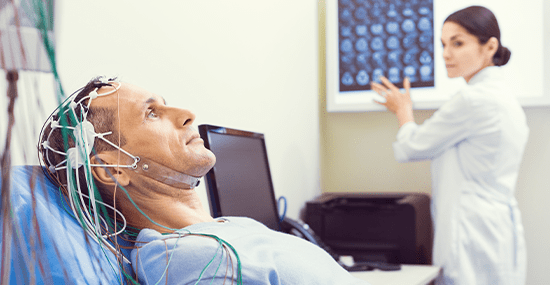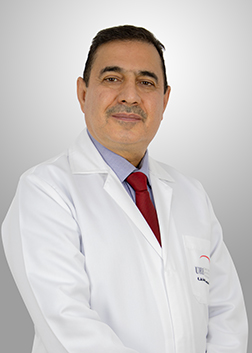Status message
Neurosurgery
Neurosurgery

Best Neurosurgery services in the UAE
Neurosurgery encompasses much more than just brain surgery. It includes the prevention, diagnosis, surgical treatment and rehabilitation of adults and paediatric patients with injuries and ailments of the brain, spinal cord, spinal column, cerebrovascular system and peripheral nervous system. The nature and condition of the disease or trauma determine the requirement of surgical/ non-surgical care.
As the best hospital in Sharjah, UHS offers neurosurgery treatment and post-treatment care to patients battling critical conditions along with patients suffering from life-hampering nerve and spine problems. Our highly experienced neurosurgeons provide comprehensive care by aligning the treatment with complementary specialities like Rehabilitation , Integrative & sports medicine and Physical medicine based on individual treatments and needful therapies for holistic recovery.
What is the scope of Neurosurgery at UHS?
Brain related conditions
The neurosurgery team at UHS comprise experts that help with diagnosing and healing an array of brain and nervous system-related conditions like Hydrocephalus, Craniosynostosis, Excision of benign and malignant brain tumours, Congenital errors, Skull deformities, etc. By analyzing the disease in the light of overall well-being, our team provides needed therapeutic care with the goal of a complete recovery.
Peripheral nerve care
Peripheral Nerves are responsible for connecting the brain and spinal cord to the other body parts and smooth functioning of muscles and organs. Stress and compression of the peripheral nerves can give the Carpal Tunnel Syndrome causing pain-numbing and tingling sensations, negatively impacting health and well-being. The experienced peripheral nerve experts at UHS offer prompt diagnosis and treatment for all peripheral nerve-related issues.
Why choose UHS for Neurosurgery related health concerns?
UHS is the best neurosurgery hospital in the UAE. It offers comprehensive neurological care by carrying out challenging and lifesaving procedures. All our surgeons have extensive experience and are proficient with the latest technical-know how to treat brain, spine and nervous system-related conditions through leading-edge approaches like computer-guided and minimally invasive procedures. UHS specializes in neurosurgery for the neurological issues listed below.
Doctors in neurosurgery
SERVICES
A Brain Stroke is an outcome of an interrupted or reduced supply of blood to a portion of the brain. Brain cells die as the reduced blood supply inhibits the brain tissues from getting sufficient oxygen and nutrients. The treatment depends on the cause and the severity of the stroke. UHS performs a multitude of invasive and non-invasive procedures to treat brain stroke.
Symtoms:
Depending on the severity of the case, the symptoms of a brain stroke include:
- Dizziness
- Nausea and vomiting
- Severe headache
- Confusion or memory loss
- Difficulty seeing or loss of vision
- Abnormal slurred speech
A brain tumour is the growth of abnormal cells in the brain. Brain tumours can be noncancerous tumours (benign) or cancerous tumours (malignant). Depending upon the severity of the condition, brain tumours are treatable through Surgery, Radiosurgery, Chemotherapy, Targeted Drug Therapy and Radiation therapy; internally directing radiation materials inside the body near the tumour and externally by directing an outsource radiation at the tumour.
Symtoms:
Depending on the type, size, growth rate and location of the tumour, the symptoms include-
- Unexplained headaches or changes in the pattern of headaches
- Difficulty with movement and balance
- Unexplained nausea or vomiting
- Seizures
- Speech issues
- Confusion or behaviour changes
- Blurred vision
- Hearing problems
Epilepsy is a neurologic disorder, causing abnormalities in the brain activities, unusual behaviour for time intervals, seizures, sensations and losing awareness/ consciousness. A person of any gender or ethnicity can develop epilepsy at any age. Lack of oxygen during birth, head abnormalities, brain tumours, genetic conditions are some of the underlying causes associated with epilepsy. An early treatment plan can help most people with epilepsy to have fewer seizures or stop them through medication or surgery to remove a small part of the brain responsible for causing seizures.
Symtoms:
- Confusion
- Staring episodes
- Involuntary jerking and twitching of arms and legs
- Deja vu, anxiety and fear
The underlying cause of Sciatica is the building of pressure on the longest nerve in the human body called the Sciatica nerve. The pressure causes pain along the nerve, flowing from the lower back to the buttocks and the legs. Generally, it affects only one side of the body and is treatable through medication and surgery if required.
Symtoms:
- Pain in the lower back and along the nerves in the lower extremities.
- The patient might experience painful sensations behind the thigh and hip zone. The patient can also feel discomfort in the foot in the form of Paresthesia, burning or pain.








